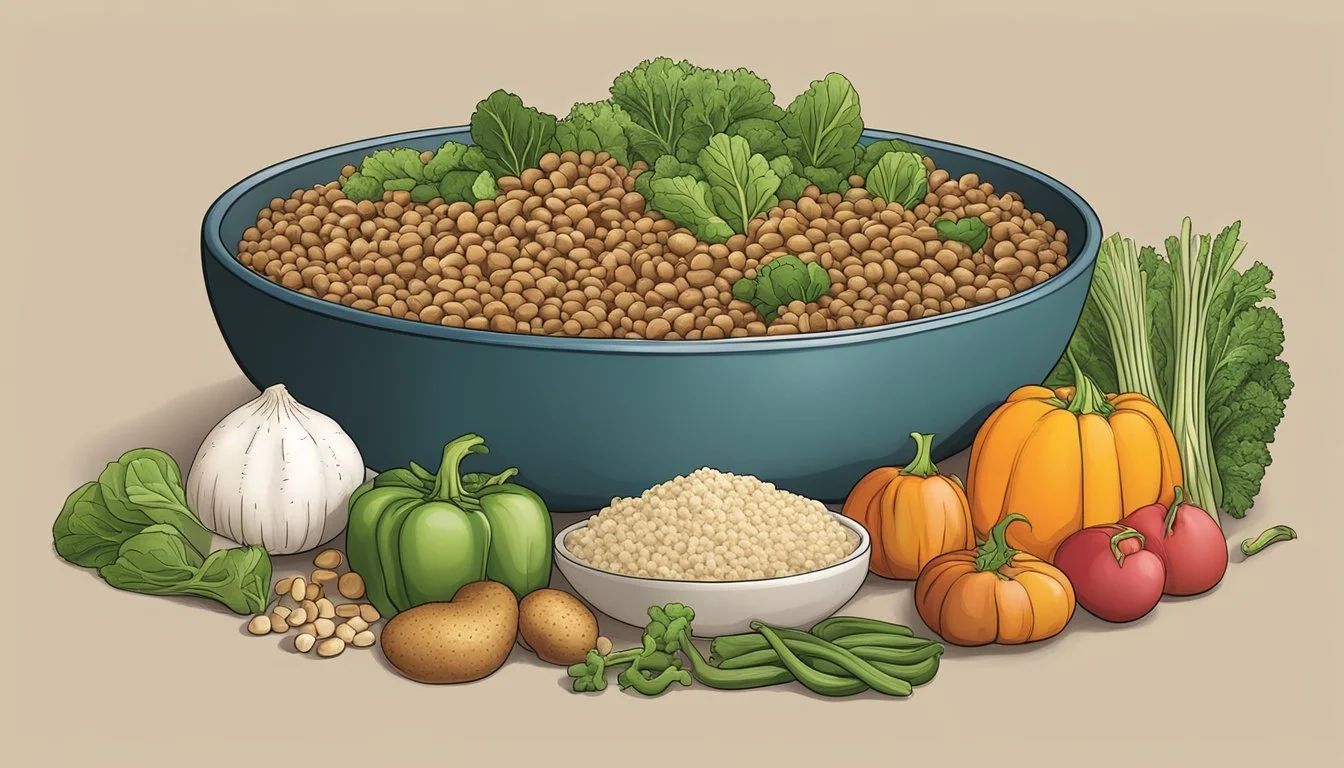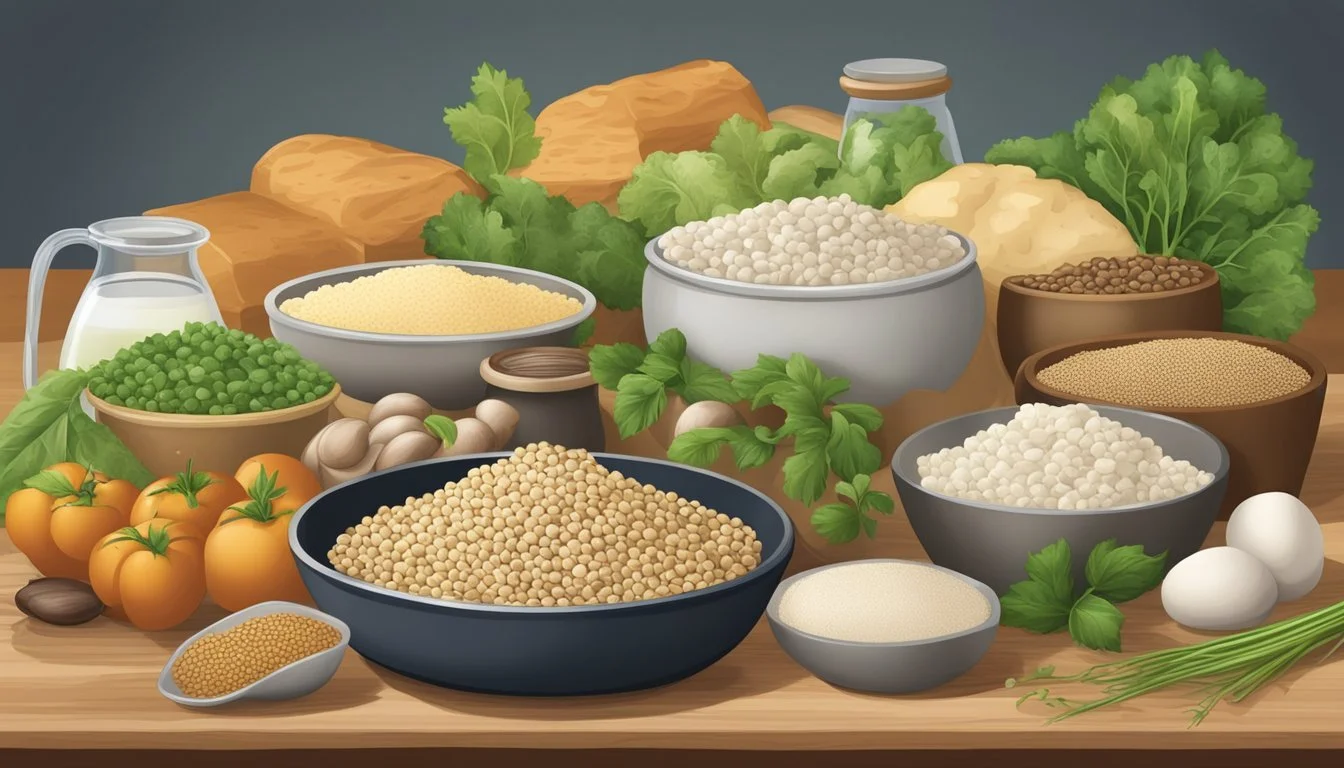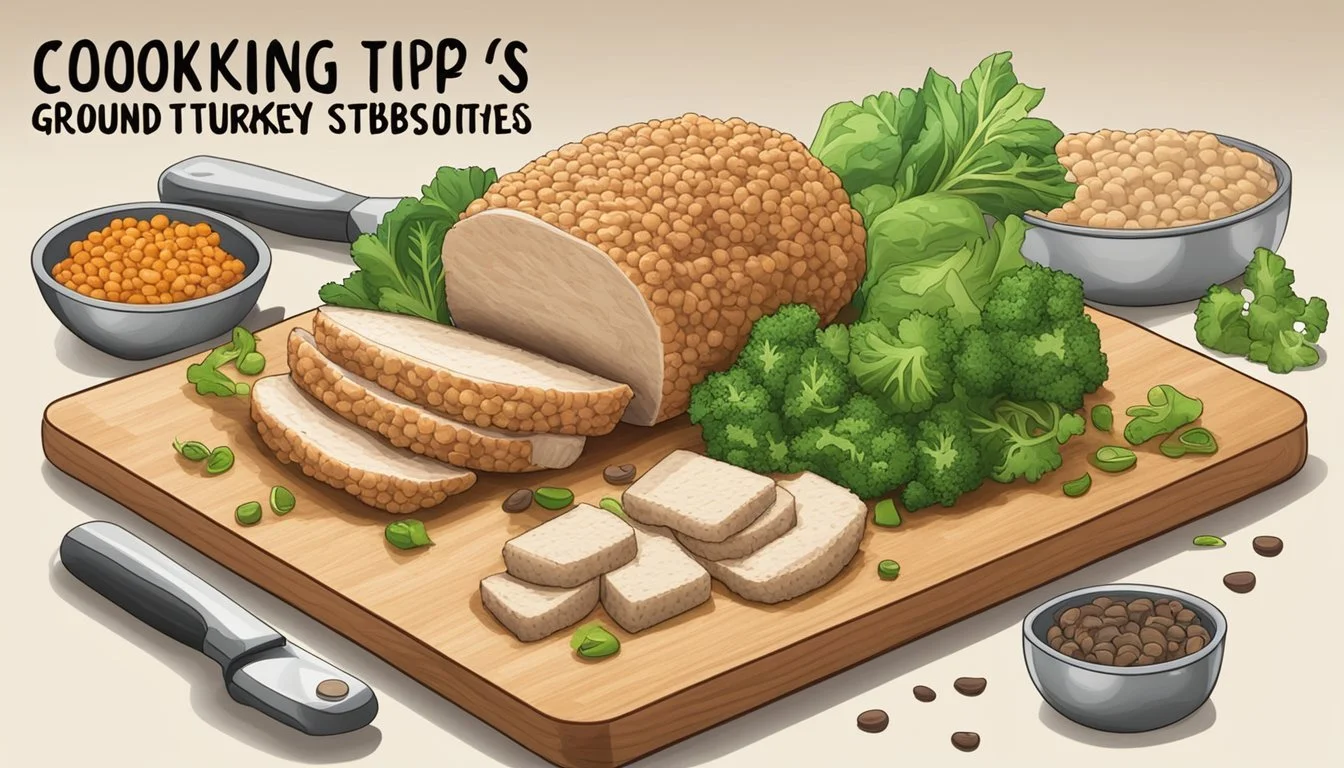Ground Turkey Substitutes
Top Alternatives for Your Recipes
Ground turkey is a popular choice for many recipes due to its lean profile and versatility. Yet, there are various situations where cooks might want or need an alternative. Substitutes for ground turkey include options like lean ground chicken, which offers a similar texture and protein content while maintaining a mild flavor. Additionally, ground pork provides a richer, slightly fatty flavor, adding moisture and tenderness to dishes.
For those seeking vegetarian or vegan alternatives, tempeh stands out as a protein-rich fermented soybean product with a distinctive nutty flavor, perfect for recipes like chili or tacos. Crumbled tempeh mimics the texture of ground turkey, enhancing the dish with its unique mouthfeel. Another excellent plant-based option is Tofurky, which offers various meatless turkey products suitable for different meal sizes.
Choosing the right substitute for ground turkey not only depends on dietary preferences but also on the desired flavor and texture of the dish. Whether opting for a meat-based option like ground chicken or a vegetarian choice such as tempeh, there are plenty of healthy and satisfying alternatives to explore.
Understanding Ground Turkey
Ground turkey is a versatile and nutritious meat option favored for its lean profile and subtle flavor. This section explores its nutritional benefits and common culinary applications.
Nutritional Profile
Lean ground turkey is popular for its low-fat percentage and high protein content. A typical 4-ounce serving contains about 170 calories, providing an excellent source of protein with approximately 22 grams per serving. Ground turkey tends to have lower calorie and fat counts compared to other ground meats like ground beef.
In terms of fat composition, ground turkey generally includes less saturated fat. Additionally, it is rich in iron and contains fewer calories and less sodium than ground chicken. The low-fat version usually has less than 10% fat content, making it a heart-healthy choice for those monitoring their cholesterol.
Common Uses in Cooking
Ground turkey's mild flavor makes it suitable for a wide range of recipes. It can replace ground beef in many dishes, offering a leaner alternative without compromising on taste. Popular dishes include tacos, meatballs, chili, and Bolognese sauce.
When cooking, it is important to reach the correct internal temperature of 170 to 175°F to ensure safety. Due to its leanness, ground turkey requires careful attention to prevent drying out. Adding ingredients like onions, tomatoes, or olive oil can help retain moisture and enhance flavor.
Ground turkey is also favored in healthy diets because it brings in fewer calories and less saturated fat, making it a fitting substitute in recipes that traditionally use higher-fat meats.
Plant-Based Substitutes
For those looking to replace ground turkey with plant-based options, an array of versatile and nutritious alternatives is available. These substitutes not only cater to vegan and vegetarian diets but also offer unique flavors and textures that can enhance various recipes.
Tofu as an Alternative
Tofu, made from soybeans, is a popular choice due to its adaptability and nutritional benefits. It can be crumbled to mimic ground turkey's texture. When seasoned well, it absorbs flavors effectively. Tofu is high in protein, which makes it a healthful replacement. It's also low in fat and can be used in dishes like tacos, stir-fries, and pasta sauces.
To achieve the best results, press the tofu to remove excess moisture and marinate it with strong seasonings such as soy sauce, garlic, and smoked paprika.
Tempeh's Versatility
Tempeh, another soy product, stands out for its firm texture and nutty flavor. Unlike tofu, tempeh is fermented, providing a slightly different taste profile. It's rich in protein and iron, making it a nutritious choice. Tempeh can be crumbled and used in recipes like chili, Bolognese sauce, or tacos.
It does well with bold seasonings and marinades, such as barbecue sauce or soy-based glazes. Its versatility allows it to be either the star ingredient or a complementary addition in various meals.
Lentils for Heartiness
Lentils are a robust and hearty substitute for ground turkey. They come in different varieties like brown, green, and red, each adding unique textures. Lentils are high in protein and fiber, making them a nutritious option.
To use lentils as a substitute, cook them until tender but not mushy. They can then be seasoned and added to dishes like stews, casseroles, or shepherd’s pie. Lentils readily absorb flavors from seasonings and broths, making them a versatile ingredient in savory dishes.
Chickpeas and Their Benefits
Chickpeas, or garbanzo beans, are another excellent plant-based substitute. They have a slightly nutty flavor and firm texture that can be mashed or left whole. Chickpeas are rich in protein, fiber, and essential vitamins.
To use chickpeas as a ground turkey alternative, roughly mash them and season with spices such as cumin, paprika, and garlic powder. They can be used in recipes like burgers, meatballs, or salads. Chickpeas also bind well with other ingredients, making them ideal for cohesive dishes.
Quinoa's Unique Offering
Quinoa offers a unique texture and is a complete protein, providing all nine essential amino acids. It’s a gluten-free grain, making it suitable for those with gluten sensitivities. Quinoa can be cooked and combined with vegetables and seasonings to create a ground turkey-like consistency.
Use quinoa in dishes such as stuffed peppers, lettuce wraps, or vegan tacos. Its light, fluffy texture pairs well with various spices and sauces, making it an adaptable addition to any meal. Quinoa also provides a good source of fiber, iron, and magnesium.
Other Meat Options
Switching from ground turkey to other meats can introduce different flavors and textures that might better suit your recipe needs. Options such as ground chicken, beef, pork, and lamb each bring their unique qualities to the table.
Utilizing Ground Chicken
Ground chicken is a great substitute for ground turkey. It offers a lean texture and mild flavor, making it a versatile option for various dishes. Ground chicken works well in recipes that call for a delicate taste, such as chicken burgers, meatballs, or casseroles. Due to its lower fat content, it's ideal for those looking to reduce their calorie intake.
For chefs, the cooking time is about the same as ground turkey. It's important to cook ground chicken thoroughly to an internal temperature of 165°F to ensure safety. A mix of dark and white meat provides the best balance between flavor and texture.
Exploring Ground Beef
Ground beef is a popular option for those desiring a richer flavor and heartier texture. It ranges from lean to fatty, allowing flexibility based on dietary preferences. Ground beef can be used in a variety of dishes such as burgers, meatloaf, and tacos. Its versatility makes it a staple in many kitchens.
When selecting ground beef, look for options that suit your desired health profile—typically, 80/20 (ground beef with 20% fat) offers a good balance for most recipes. Unlike ground turkey, ground beef provides a juicier outcome, but it also requires careful draining of excess fat after cooking.
The Use of Ground Pork
Ground pork brings a unique, slightly sweet flavor to recipes, setting it apart from other substitutes. It offers a higher fat content than ground turkey, making dishes like sausages, dumplings, and stir-fries richer and more flavorful.
Because of its fat content, ground pork tends to remain moist and tender during cooking. Cooks can use it in combination with other meats or on its own. Ensure it's cooked to at least 160°F. The combination of versatility in both Western and Asian cuisine makes it a valuable alternative.
Leaner Choice: Ground Lamb
Ground lamb provides a distinct, robust flavor, and it can be leaner compared to other red meats. It is commonly used in Mediterranean and Middle Eastern dishes such as kebabs, shepherd’s pie, and moussaka.
Ground lamb has a firmer texture and pairs well with strong spices like cumin and coriander. Although lamb can be more expensive than other ground meats, its unique taste profile can elevate simple dishes. Ensure to cook it to an internal temperature of 160°F, similar to ground beef.
Vegetables as Substitutes
Vegetables can be excellent alternatives to ground turkey, providing varied flavors and nutritional benefits. They offer unique textures and can be easily incorporated into various dishes to suit vegan and vegetarian diets.
Mushrooms for Umami
Mushrooms are a popular choice due to their rich, umami flavor. They are particularly effective in dishes where a hearty, meaty taste is desired.
Texture: Mushrooms can mimic the texture of ground meats when finely chopped or minced.
Types: Portobello and shiitake mushrooms are particularly effective.
Usage: Ideal for use in Bolognese sauces, tacos, and chilies.
Nutritional Value: They are low in calories and fat but provide essential nutrients like vitamins B and D.
Cauliflower's Adaptability
Cauliflower is extremely adaptable and can be used in multiple forms to replace ground turkey.
Texture: It has a versatile texture that works well in a variety of dishes.
Preparation: Can be finely diced or food processed to resemble rice or small meat crumbles.
Usage: Frequently used in stir-fries, curries, and even as a base for cauliflower steaks.
Flavor: Although mild, it can absorb the flavor of aromatics and spices used in cooking.
Butternut Squash's Sweetness
Butternut squash adds a unique sweetness and creamy texture to recipes, making it a good substitute for ground turkey in certain dishes.
Texture: Softens well when cooked, providing a creamy texture.
Preparation: Can be roasted or boiled and then mashed similarly to potatoes.
Usage: Excellent in soups, stews, and mashed potato-like dishes.
Nutritional Value: Rich in vitamins A and C, and can add a vibrant color to your meals.
These vegetable substitutes offer a range of textures and flavors, making them suitable for an array of recipes while adhering to vegan and vegetarian dietary preferences.
Processed Meat Alternatives
Various processed meat alternatives offer appealing options that are high in protein and rich in taste. Explored below are products from Field Roast, Tofurky, seitan-based choices, and Gardein’s offerings.
Feasting with Field Roast Products
Field Roast offers a range of plant-based meats known for their robust flavors. The Field Roast Celebration Roast stands out as a holiday favorite, featuring a blend of grains and vegetables. Popular options from Field Roast include their Vegan Turkey Substitute and Vegan Pot Pie, which cater to different culinary needs.
Veggie Burgers from Field Roast are crafted to provide a wholesome experience, combining protein-packed ingredients that mimic the texture and taste of traditional meat.
Tofurky's Specialties
Tofurky specializes in creating versatile, soy-based products. Their famous holiday roasts include rich, seasoned fillings that make a satisfying centerpiece for plant-based meals.
Tofurky offers deli slices and sausages that can easily substitute traditional meats in sandwiches and salads. High in protein, these options ensure that the nutritional needs of a meat-free diet are met without compromising on taste.
Sampling Seitan
Seitan, made from wheat gluten, is a favorite for those seeking a chewy and meat-like texture. Commonly known as wheat meat, seitan absorbs flavors well, making it a versatile ingredient.
Seitan can be found in various forms, including ground seitan and seitan-based roasts. These products are excellent for dishes like stir-fries, stews, and even as a vegan turkey substitute in traditional recipes.
Gardein’s Grounds
Gardein's Grounds provide a convenient and tasty alternative to ground meat. These plant-based crumbles are designed to mimic the texture of ground beef, making them perfect for tacos, chili, and spaghetti sauces.
Rich in protein and low in fat, Gardein’s products, including veggie burgers and other meat substitutes, offer a healthier alternative while maintaining the satisfaction of traditional meat dishes. Their vegan turkey substitutes are especially popular for holiday meals and special occasions, providing a festive yet nutritious choice.
Seasonings and Flavors
Enhancing ground turkey with the right seasonings is crucial to elevate its taste and make dishes memorable. This guide covers essential herbs and spices, as well as methods to create flavorful mixes for diverse culinary creations.
Herbs and Spices for Ground Turkey
Ground turkey benefits greatly from a variety of herbs and spices. Garlic and onion powder are essential for adding a base flavor. Paprika brings a mild heat and vibrant color. Cumin and chili powder add depth and warmth, perfect for chili and taco recipes.
Dried thyme and oregano work well for more Mediterranean dishes, adding earthy and slightly minty notes. For a bit of complexity, white pepper can add a subtle heat that is less potent than black pepper. Using fresh or dried parsley also brightens the flavor profile, balancing the richer notes.
Creating Flavorful Mixes
Creating flavorful seasoning mixes can save time and ensure consistency in your dishes. A simple blend might include:
2 tsp paprika
1 tsp garlic powder
1 tsp onion powder
1 tsp cumin
1/2 tsp cayenne pepper
1/2 tsp dried thyme
This mix can be adjusted based on preference. For a spicier palette, increasing the cayenne pepper works well. For Italian dishes, adding basil and oregano creates an Italian blend.
To apply, mix the seasonings thoroughly with ground turkey before cooking. The seasoning can also be sprinkled on the meat during cooking for a more pronounced flavor. Remember that a balance of spices helps in creating a nuanced dish, so always taste and adjust as needed.
Culinary Application
Ground turkey can be seamlessly replaced with several other ingredients in various dishes. Each substitute provides a unique flavor and texture, allowing for flexibility in recipes while maintaining delicious and nutritious meals.
Meatloaf and Mains
When preparing meatloaf or main dishes, ground chicken can serve as a versatile substitute for ground turkey. It provides a similar lean protein option, ensuring that the dishes remain light and healthy. Ground pork, on the other hand, adds a richer flavor and additional moisture, creating a more succulent dish. Including ingredients like stuffing mix, Worcestershire sauce, and gravy can enhance the overall taste profile, giving the dish depth and complexity.
Wholesome Shepherd’s Pie
For Shepherd’s Pie, crumbled tempeh offers a robust flavor and texture that mimic ground turkey. Its high protein content makes the dish hearty and satisfying. Ground lamb is another excellent option, imparting a slightly richer taste. When crafting the gravy for the pie, including ingredients like Worcestershire sauce helps boost the umami flavor. Topping the dish with creamy mashed potatoes ensures a perfect balance of flavors and textures.
Stuffed Peppers Delights
Stuffed peppers can be made more enjoyable with ingredients like Tofu, which absorbs the spices and sauces well, maintaining a good texture. Ground chicken also works superbly, maintaining a light and healthy profile. Using leftovers such as rice or quinoa, combined with cranberry sauce and spices, offers a flavorful and resourceful way to create a delicious filling. This versatility allows for creative combinations while ensuring a satisfying meal.
Turkey Burgers and More
In place of ground turkey in burgers, ground chicken remains a top choice for a leaner patty. For a more indulgent experience, ground pork can be used to make juicier burgers with a rich flavor. Tofu burgers can also be crafted by marinating the tofu and adding breadcrumbs for texture. Condiments like gravy or cranberry sauce can provide an extra punch of flavor. Additionally, incorporating Worcestershire sauce into the patties can enhance the taste dramatically.
These alternatives maintain the integrity and enjoyment of the dishes while offering variety and creativity in cooking.
Health Considerations
When choosing a substitute for ground turkey, it's important to consider the health implications, particularly in terms of fat intake and heart disease.
Comparing Fat Intake
Ground turkey is often chosen for its lower fat content compared to other meats. For instance, 93/7 ground turkey (93% lean, 7% fat) contains about 8.9 grams less total fat than ground beef with a 70/30 ratio.
Other substitutes like ground chicken and ground pork can vary in fat content. Ground chicken has a comparable profile to ground turkey but may contain more saturated fat depending on the cut. Ground pork, while flavorful, is richer in fats and calories compared to lean turkey and chicken options.
Plant-based alternatives like tempeh and tofu typically contain significantly less saturated fat, making them ideal for those focused on reducing fat intake.
Impact on Heart Disease
Reducing saturated fat is crucial in managing heart disease risk. Ground turkey, especially the lean varieties, contains less saturated fat than ground beef. For instance, 93/7 ground turkey has fewer saturated fats compared to ground beef with a 70/30 fat percentage, making it a healthier option for heart-conscious consumers.
Ground lamb, although a robust substitute, is higher in fats and may not be suitable for those monitoring heart health. Plant-based substitutes like tempeh not only offer low saturated fat levels but also provide additional health benefits such as improved digestion and reduced inflammation, supporting overall cardiovascular health.
Cooking Tips
When using ground turkey substitutes, ensuring the right texture and adjusting the cooking time is crucial. Pay attention to seasonings, internal temperature, and other factors to achieve the best results.
Achieving the Right Texture
Getting the correct texture with ground turkey substitutes can be challenging. Ground chicken, for instance, has a mild flavor but can be somewhat dry. Adding a small amount of oats or breadcrumbs can enhance the texture. Ground pork provides a richer, more tender result because of its higher fat content.
For vegetarian options like tempeh, crumbling it finely helps to mimic the texture of ground turkey. Adding a bit of moisture, such as broth or a small amount of gravy, can make the substitute feel more like ground meat. Proper seasoning is key here; use bold flavors and spices to compensate for any textural differences.
Adjusting Cooking Time
When substituting ground turkey with other meats or vegetarian options, cooking time needs adjustment. Ground chicken and ground pork both cook differently. Chicken should reach an internal temperature of 165°F, while pork is safe at 160°F. Make sure to check with a meat thermometer.
Vegetarian substitutes like tempeh require different handling. Since tempeh is already cooked, it only needs to be heated through, typically taking about 5-10 minutes in a pan. If using ground pork or chicken, remember that their cooking times might vary depending on size and moisture content. Adjust seasoning and heat accordingly to ensure even cooking and flavored, well-integrated dishes.








